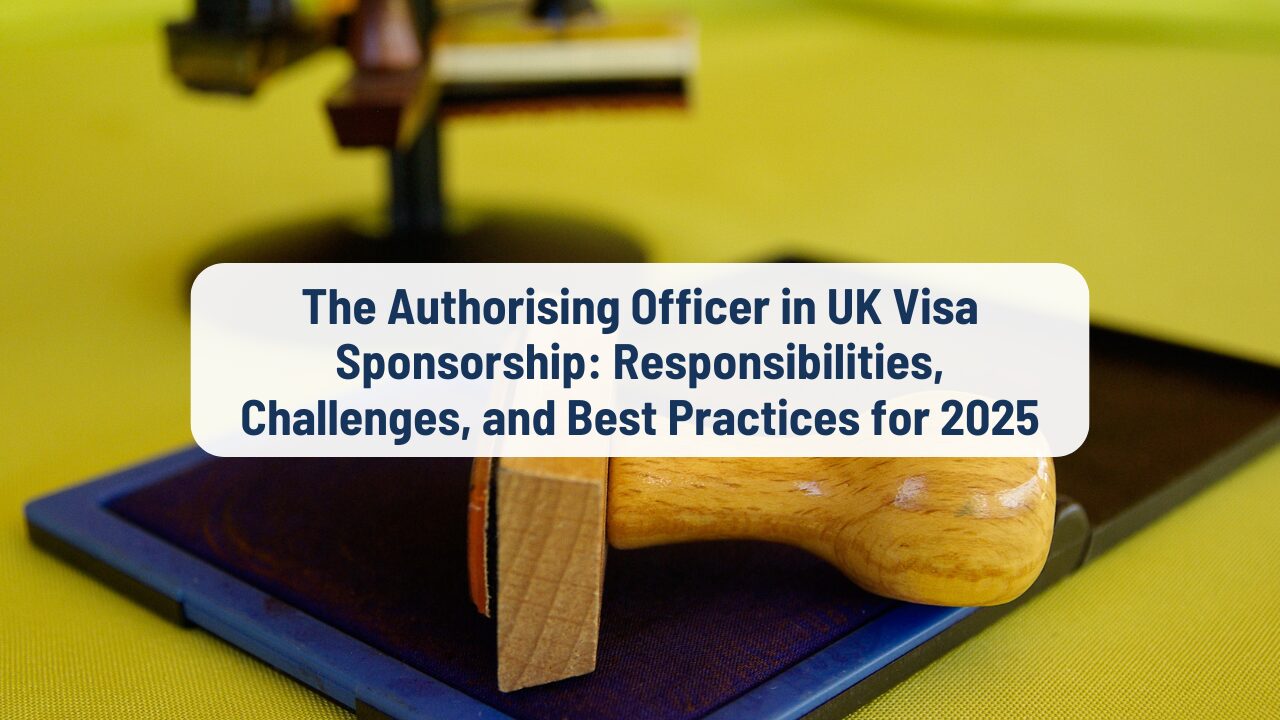
Introduction
In today’s tight regulatory environment, the Authorising Officer (AO) role has emerged as a linchpin for organisations wishing to sponsor international talent. Tasked with ensuring that all aspects of a company’s UK visa sponsorship comply with Home Office guidelines, the AO functions as both guardian and guide within the sponsorship framework. As immigration policies evolve in 2025, the AO’s responsibilities have expanded considerably, making it imperative for employers to understand what the role entails and how best to support the individual in this critical position.
Who is the Authorising Officer?
An Authorising Officer is the most senior person within an organisation responsible for managing visa sponsorship compliance. Typically, a company director, HR manager, or another high-ranking official, the AO bears ultimate responsibility for:
- Overseeing the recruitment and sponsorship of migrant workers.
- Ensuring that all sponsored employees meet the eligibility criteria.
- Acting as the primary liaison with the Home Office and managing the Sponsorship Management System (SMS).
Rather than being a mere administrative role, the AO is a strategic leader who ensures that an organisation consistently demonstrates integrity and alignment with the rigorous standards set by UK Visas and Immigration (UKVI).
Core Responsibilities
1. Compliance Oversight
The principal duty of the Authorising Officer is to guarantee that the organisation meets all UKVI compliance requirements. This includes:
- Regular Auditing: Conducting periodic internal audits of all sponsorship records.
- Accurate Record-Keeping: Maintaining comprehensive documentation of Certificates of Sponsorship (COS), right-to-work checks, and employee records.
- Proactive Reporting: Timely notifying UKVI about changes in an employee’s status, such as job role adjustments, resignations, or departures from the company.
2. Management of the Sponsorship Management System (SMS)
The AO is often the primary user of the UKVI’s SMS, where they are responsible for:
- Assigning Cos: Allocating sponsorship certificates to eligible employees.
- Updating Information: Ensuring the SMS reflects up-to-date details about all sponsored workers.
- Monitoring Usage: This involves overseeing access by other designated SMS users (such as Key Contacts and Level 1 Users) and ensuring coordinated compliance measures.
3. Leadership and Training
An effective AO provides strategic leadership by:
- Training Staff: Organising training sessions for HR and recruitment teams on current immigration laws and internal compliance procedures.
- Setting Clear Protocols: Developing and enforcing standard operating procedures (SOPS) for document management and internal reporting.
- Fostering a Culture of Compliance: Encouraging transparency and accountability across all levels of the organisation.
4. Liaison with Regulatory Bodies
The AO acts as the primary point of contact for the Home Office and must:
- Respond to Audits: Prepare for and manage Home Office audits, promptly addressing any queries or non-compliance issues.
- Communicate Changes: Stay informed of regulatory updates and ensure that the organisation’s policies and procedures are regularly updated to reflect new rules.
Essential Qualifications and Attributes
Given the high stakes involved in visa sponsorship, the ideal Authorising Officer should possess:
- Senior Leadership Experience: A background in HR, compliance, or legal roles with significant oversight responsibility.
- Deep Knowledge of Immigration Law: Familiarity with UKVI guidelines and the nuances of sponsor licence requirements.
- Robust Organisational Skills: Proven in managing detailed records and complex compliance systems.
- Strong Communication Skills: The aptitude to liaise effectively with both internal teams and external regulators.
- Integrity and Accountability: A reputation for upholding ethical standards and a commitment to compliance.
Table: Key Qualifications for an Effective Authorising Officer
| Attribute | What It Entails |
| Senior Leadership Experience | Proven track record in managing regulatory compliance |
| Immigration rules understanding | Detailed understanding of current UKVI regulations |
| Organisational Proficiency | Ability to handle complex documentation and audits |
| Communication Skills | Effective liaison and reporting to internal/external parties |
| Integrity | Maintaining high ethical standards in all sponsorship activities |
Challenges Faced by Authorising Officers
While the role is central to maintaining sponsor licence integrity, several challenges can hinder success:
- Rapidly Changing Regulations: The continuous evolution of immigration laws requires constant learning and process adjustments.
- Resource Demands: Managing intricate records, frequent audits, and detailed reporting often requires significant time and manpower.
- High Risk of Non-Compliance: Even minor oversights can result in severe penalties, including fines, licence downgrades, or revocations.
- Coordination with Multiple Stakeholders: Balancing the responsibilities across several teams (HR, legal, recruitment) necessitates robust communication and leadership skills.
Strategies for Overcoming Challenges
To navigate these challenges, organisations and their AOS should consider the following best practices:
- Implement Digital Solutions: Adopt digital compliance management tools for real-time document tracking and automated reminders for reporting.
- Regular Training and Updation: Schedule continuous training sessions to keep all relevant staff updated on the latest immigration policies and internal compliance requirements.
- Establish Clear Internal Protocols: Develop and circulate detailed SOPS that cover every aspect of the sponsorship process, from initial application to audit responses.
- Foster a Collaborative Environment: Encourage collaboration between departments to ensure compliance measures are uniformly understood and implemented.
- Consultation with Experts: Consult external legal and immigration consultancy services to audit internal processes and provide independent oversight.
The Future of the Authorising Officer Role
As immigration policies tighten and the need for stringent compliance grows, the role of the Authorising Officer is set to expand further. Anticipated trends include:
- Enhanced Digital Integration: Greater reliance on sophisticated software to streamline compliance.
- Stricter Regulatory Scrutiny: More frequent and detailed audits, demanding higher levels of preparedness.
- Increased Accountability: Greater personal accountability for AOS directly impacts an organisation’s ability to sponsor talent.
Organisations that invest in the continuous development of their AOS will be better positioned to navigate this complex landscape, ensuring both regulatory compliance and competitive advantage in global recruitment.
Conclusion
The Authorising Officer is far more than an administrative figure; they are the cornerstone of a company’s ability to sponsor international talent legally compliantly. With heightened responsibilities in 2025, this role demands exceptional leadership, meticulous attention to detail, and a proactive approach to regulatory changes. Organisations can secure their sponsor licence by understanding the multifaceted nature of the AO’s duties, implementing robust internal controls, and contributing to a transparent, effective immigration system.
Embracing the challenges and opportunities of the Authorising Officer role today paves the way for a resilient and forward-thinking approach to UK visa sponsorship in the years to come.
For Legal and Business Solution, visit: ST Consultancy
Follow Us:
Facebook – https://www.facebook.com/profile.php?id=61564973949911
Instagram – https://www.instagram.com/stconsultancy_stc/
Twitter – https://x.com/st_stc43927
LinkedIn – https://www.linkedin.com/company/st-consultancy-ltd, Dr. Erika Szita-Szegedi, Manmeet Abroll

